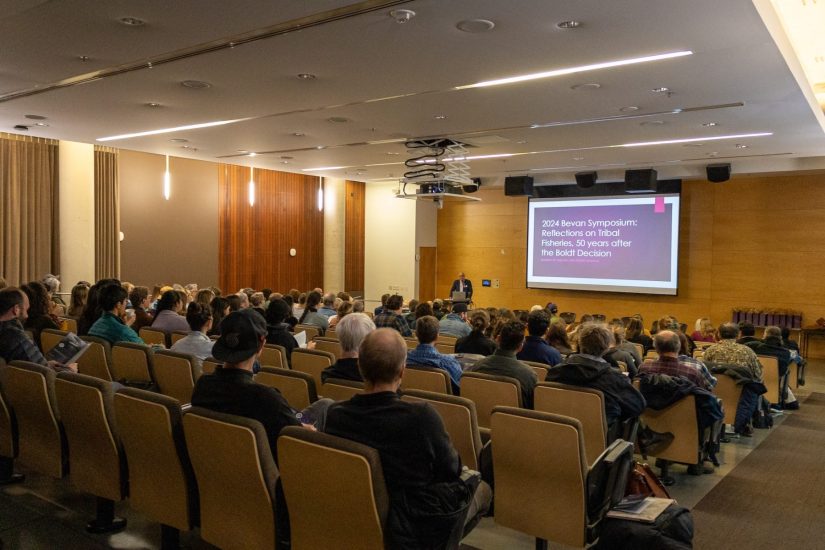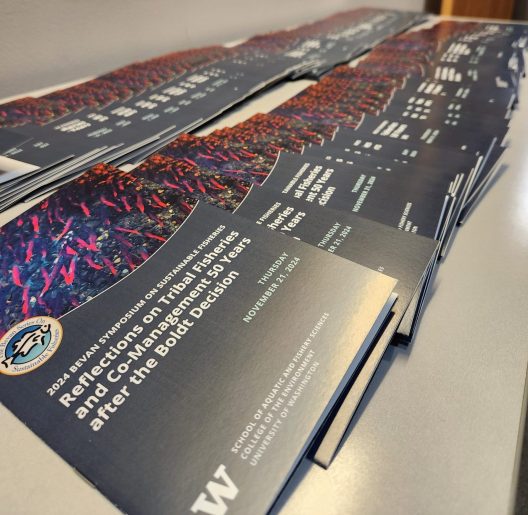50 years ago in 1974, Judge George Boldt made a ruling in the case of U.S. v. Washington State, which upheld Tribal treaty-reserved fishing rights. This upheld the Tribe’s entitlement to half the harvestable number of salmon returning to or passing through the Tribes’ usual and accustomed fishing places, and established the Tribes as co-managers of the salmon resource with the state. It also required the state to take actions to sustain the resources, mentioned directly in the ruling: “The most fundamental prerequisite to exercising the right to take fish is the existence of fish to be taken.” This became known as the Boldt Decision.
50 years later on November 21, 2024, the UW School of Aquatic and Fishery Sciences (SAFS) hosted this year’s annual Bevan Seminar as a special one-day symposium reflecting on Tribal fisheries, their co-management since this landmark decision, and what the the next 50 years will look like for Washington fisheries. Centering on Tribal voices, the symposium heard from Tribal leaders, elders, scientists, artists and lawyers, through a series of panels and Q&A discussions.
Many of us working or studying at the University of Washington hadn’t heard about the Boldt Decision until recently. As someone relatively new to both UW and to Washington, this was certainly true for me. When sitting through the symposium, I wondered how many others might be unaware of this ruling, why it came about, and its impact on two core parts of Washington: salmon and the Tribes.

Beginning the event with a prayer from Phil Hamilton from the Muckleshoot Tribe and an opening address from SAFS Director, Tim Essington, members of the audience heard about the stories and people behind the Boldt Decision. Discussions covered why salmon are so important to Washington Tribes – culturally, spiritually, economically – and accounts of the struggles to uphold Treaty-reserved fishing rights. The 200 or so members of the audience were also reminded by Chairman Jaison Elkins from the Muckleshoot Tribe that: “If you want to be a good fisherman, you need to be a good biologist. Our Tribes have always believed in science and observations to protect our salmon.”
One of the strong messages emerging from the event was the need to protect salmon, in the face of many threats including climate change, and for a whole host of reasons including subsistence, economic development, cultural practices, and conservation. Scott Schuyler from the Upper Skagit Tribe told us that: “When our ancestors signed the Treaty, they sacrificed everything to reserve this right to fish in perpetuity. What it means, is when the fish are gone, it’s diminished the right and value of the Treaty.” As pointed out by Mary Neil, a member of the Lummi Nation and attorney for the Muckleshoot Tribe, and whose decision to attend law school was partly because of the Boldt Decision, the fight isn’t just for fishing rights and the ability to fish, “but to protect our way of life.”
An important reason for SAFS hosting this event was to help educate those in our programs, and in the wider community both internally and externally to UW (me included), about what exactly the Boldt Decision was, and its lasting impact on Tribal fisheries in Washington. The first panel of the day did just this as it focused on the challenges, successes, and opportunities for co-management. A strong message heard during this panel was the way Tribes have taken a hearts and mind approach to co-management: “Telling the State what’s in our heart but telling them in a way in which the State understands – technically”.

Another recurring theme, and a challenge faced by Tribes, was the need to re-educate co-managers on their treaty rights, especially as new people come in with changes in local, state, and federal government every few years. This highlighted how the younger generation of scientists coming out of institutions such as the fisheries program at UW, have a key role in learning from Tribes and being a part of that ongoing re-education when working in future careers in public, private and government sectors. “It shouldn’t just be Tribal people reminding the government of the law of the land, it should be everyone”, said Maia Bellon from Cascadia Law Group.
The second panel discussed sustaining Tribal fisheries for the next 50 years. Apart from acknowledging the mass of sustainability challenges – particularly for salmon which require intact ecosystems from the land to the sea – we were also reminded that it is the joint responsibility of everyone to ensure the sustainability of fisheries. This responsibility doesn’t fall solely at the hands of the Tribes.
Finishing up the panel session part of the day was a discussion of Tribal fisheries’ cultural resiliency and food sovereignty during a time of climate change. A central takeaway was the need for Tribes to be sitting at management tables with equal status by being present in management schemes and policy strategy discussions, at every step of the way.
To end the day, SAFS PhD student, Nicole Doran, who helped organize the event, led a Q&A discussion about dos and don’ts for respectful research collaboration with Tribes, with participation from Vanessa Castle (Lower Elwha Klallam Tribe, Ridges to Riffles) and Ashley Nicole Lewis (Quinault Nation, Bad Ash Outdoors). Starting from a place of trust-building and relationship-building is essential and should precede any collaborative work with Tribes. Traditional ecological knowledge is not something that should be co-opted by non-Indigenous scientists because it removes that knowledge from the communities and from places where that knowledge was developed.

“We also talked a lot about consent – it’s really important to establish clear boundaries with collaborators, especially over data ownership, the intentions behind a collaboration, and the objectives of the project. ‘No means no’ definitely applies here, and if you are not sure what a collaborator’s boundaries are, it is always important to ask,” Nicole shared. “Putting in the work before starting the work” was another strong message coming through the Q&A session. Before reaching out to a Tribe, familiarize yourself with the Tribe you are interested in working with, find out who would be the best person to connect with, and really take the time to examine what your own intentions are.
“During this event, the UW community was incredibly fortunate to hear – and learn from – leaders and elders from different Washington Tribes,” Tim Essington said in his closing address. “The success of this symposium will be judged by what happens next – how we work to teach our graduate and undergraduate students about Tribal treaty rights, and how we meaningfully engage in our shared responsibility to protect our aquatic ecosystems.”
We would like to extend a special thank you to all of the panelists who joined us and made this event possible, and who took the time to provide their unique insights into the challenges, successes and future of co-management of fisheries in Washington:
- Maia Bellon, Cascadia Law Group
- Vanessa Castle, Lower Elwha Klallam Tribe, Ridges to Riffles
- Ron Charles, Port Gamble S’Klallam Tribe
- Chairman Jaison Elkins, Muckleshoot Tribe
- Roger Fernandes, Lower Elwha Klallam Tribe
- Phil Hamilton, Muckleshoot Tribe
- Cleve Jackson, Quinault Nation
- Ed Johnstone, Quinault Nation. Chair, Northwest Indian Fisheries Commission
- Ashley Nicole Lewis, Quinault Nation, Bad Ash Outdoors
- Micah McCarty, Makah Tribe
- Connie McCloud, Puyallup Tribe
- Mary Neil, Lummi Nation. Legal counsel for the Muckleshoot Tribe
- Jason Schaffler, Senior Quantitative Scientist for the Muckleshoot Tribe
- Scott Schuyler, Upper Skagit Tribe
- Chet Tweed, Quinault Nation
- Dana Wilson, Lummi Nation
- Shawn Yanity, Stillaguamish Tribe